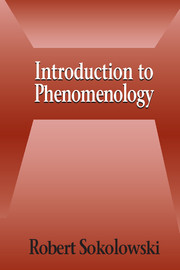Book contents
- Frontmatter
- Contents
- Acknowledgments
- Introduction
- 1 What Is Intentionality, and Why Is It Important?
- 2 Perception of a Cube as a Paradigm of Conscious Experience
- 3 Three Formal Structures in Phenomenology
- 4 An Initial Statement of What Phenomenology Is
- 5 Perception, Memory, and Imagination
- 6 Words, Pictures, and Symbols
- 7 Categorial Intentions and Objects
- 8 Phenomenology of the Self
- 9 Temporality
- 10 The Life World and Intersubjectivity
- 11 Reason, Truth, and Evidence
- 12 Eidetic Intuition
- 13 Phenomenology Defined
- 14 Phenomenology in the Present Historical Context
- Appendix: Phenomenology in the Last One Hundred Years
- Select Bibliography
- Index
14 - Phenomenology in the Present Historical Context
Published online by Cambridge University Press: 05 June 2012
- Frontmatter
- Contents
- Acknowledgments
- Introduction
- 1 What Is Intentionality, and Why Is It Important?
- 2 Perception of a Cube as a Paradigm of Conscious Experience
- 3 Three Formal Structures in Phenomenology
- 4 An Initial Statement of What Phenomenology Is
- 5 Perception, Memory, and Imagination
- 6 Words, Pictures, and Symbols
- 7 Categorial Intentions and Objects
- 8 Phenomenology of the Self
- 9 Temporality
- 10 The Life World and Intersubjectivity
- 11 Reason, Truth, and Evidence
- 12 Eidetic Intuition
- 13 Phenomenology Defined
- 14 Phenomenology in the Present Historical Context
- Appendix: Phenomenology in the Last One Hundred Years
- Select Bibliography
- Index
Summary
We will now gain a final perspective on phenomenology by looking at how it fits into the present philosophical scene. Toward the end of Chapter 13, we noted that both Descartes and Hobbes try to replace the natural attitude by the philosophical. They think that philosophy can not only clarify but also replace the knowledge proper to prephilosophical thinking. This belief in the power of philosophical reason, along with this suspicion about other forms of experience, is typical of modernity. Phenomenology understands philosophy very differently. It believes that prephilosophical intelligence ought to be left intact, that it has its own excellence and truth, and that philosophy contemplates the prephilosophical without replacing it. Thus, while phenomenology originates within modern philosophy, it also takes a distance from it. To show how it does so, let us begin with an interpretation of modernity.
MODERNITY AND POSTMODERNITY
Modern philosophy has two major components: political philosophy and epistemology. In both these components, modern philosophy defined itself, in its origins, as a revolution against ancient and medieval thought. Machiavelli, at the beginning of the sixteenth century, prided himself on initiating new modes and orders in political life, and Francis Bacon and Descartes, in the early seventeenth century, declared that they were introducing new ways of thinking about nature and the human mind, ways which require that we abandon our inherited and commonsense convictions and take up a new method of directing our minds in the search for knowledge.
- Type
- Chapter
- Information
- Introduction to Phenomenology , pp. 198 - 210Publisher: Cambridge University PressPrint publication year: 1999



